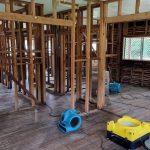When considering drywall installation, it’s important to explore various techniques and strategies to achieve the best results for your project. Whether you are upgrading a room for aesthetic appeal or replacing existing drywall due to damage, having comprehensive knowledge about the process is essential. Before you decide to hire a handyman, it’s imperative to understand several critical factors. This includes verifying the handyman’s licensing credentials, comprehending the cost of drywall installation, and selecting a qualified professional who can meet your specific needs and preferences.
Steps to Secure a Handyman’s License for Professional Drywall Installation
If you have aspirations of entering the drywall installation industry, prioritizing the acquisition of a handyman’s license is crucial. Although not all states mandate this credential, many do require it to ensure adherence to local regulations and standards. To understand your specific requirements, it’s advisable to conduct thorough research on the licensing criteria in your state, as these can vary significantly.
For smaller tasks like painting or minor appliance repairs, most states do not require a handyman’s license. However, if you plan to undertake larger projects, it may be necessary to obtain a separate license for each type of work, depending on local legislation. This ensures that you are fully compliant with the laws governing your area.
Moreover, securing insurance is essential in addition to obtaining a handyman’s license. A comprehensive contractor’s liability and property damage insurance policy safeguards you against potential injuries or damages that may occur on the job site. If you intend to hire employees, it is also critical to obtain workers’ compensation insurance to protect your workforce. A careful review of construction plans will aid in accurately estimating material and labor costs, which is essential for submitting competitive bids that maintain quality standards.
When applying for a handyman’s license specific to drywall installation, there are certain standards and criteria that must be fulfilled. For example, in Georgia, applicants are required to pass examinations related to trade, business, and law. Additionally, having at least two years of hands-on experience as a handyman alongside proof of general liability and workers’ compensation insurance is necessary. In places where projects exceed $1,000 or require construction permits, such as Hawaii, a general contractor’s license may also be mandatory.
While a handyman’s license for drywall installation isn’t universally required, it is highly recommended for those planning to undertake more extensive work beyond simple repairs and installations. Each state has its unique requirements, but generally, having liability insurance and a handyman’s license is vital to protect against potential legal issues and property damage claims that may arise during your work.
To thrive as a handyman, it is essential to familiarize yourself with the diverse standards and licensing requirements that exist across different states. Local regulations can vary significantly, so conducting thorough research is crucial if you aim to manage various projects effectively and legally.
A Comprehensive Analysis of Drywall Installation Costs
The overall cost of drywall installation is shaped by numerous factors, including the scope of the project and the types of materials needed. For instance, larger holes typically require full drywall replacement, which can considerably influence the total expense of your project. Furthermore, the quantity of materials necessary will directly impact both material and labor costs, making it imperative to accurately assess the size and complexity of the job at hand. A skilled handyman can often complete smaller tasks efficiently in just a few hours, which can also help in managing costs effectively.
Conversely, significant drywall repairs—such as those necessitated by extensive holes or water damage—require more time and expertise. In severe cases, entire sections of drywall may need to be removed and replaced. This scenario often calls for the skills of a professional with specialized training, thus potentially increasing the overall project costs.
Proper planning and meticulous preparation are fundamental when it comes to drywall installation. Creating a comprehensive list of necessary supplies and tools is crucial, and the overall cost will be determined by both the area size and the job’s complexity. Often, handymen will require additional help, especially for larger projects. Additionally, the installation cost can vary based on whether prep work and cleanup are needed. Complex ceiling designs or areas with numerous corners can also contribute to increased material and labor expenses, making it important to factor these elements into your budgeting.
The type of drywall selected will significantly influence the total cost of installation as well. Standard drywall, commonly used in most commercial constructions, is available in various widths and thicknesses to suit different needs.
For larger projects, expenses can escalate quickly. The overall cost largely depends on the project’s size and intricacy. Smaller jobs may have a higher cost per square foot, but drywall remains a cost-effective choice compared to other construction materials, making it an attractive option for many homeowners and contractors alike.
While hiring a handyman may appear to be a budget-friendly option, enlisting the services of a drywall specialist can yield superior results. Specialists possess the advanced knowledge and skills necessary for tasks ranging from removing outdated popcorn ceilings to constructing intricate drop ceilings. Their expertise in taping joints and applying textures can ensure a higher caliber of work. Moreover, they are adept at addressing issues such as water damage, hole repairs, and more complex texturing techniques, ensuring your project is handled with care and precision.
When selecting a drywall contractor, it’s crucial to obtain a detailed contract that clearly outlines the project scope and associated costs. The contract should specify the number of drywall sheets required, the type of material to be used, and provide a comprehensive breakdown of labor and material expenses. This level of detail will help prevent misunderstandings and ensure that both parties are aligned on expectations.
Key Considerations for Choosing the Ideal Handyman for Your Drywall Projects
Before hiring a handyman for drywall installation, it’s essential to pose several key questions to ensure you make a well-informed decision. Begin by inquiring about the estimated timeline for your project. Even the most skilled drywall installers may have differing schedules, so understanding the expected timeframe can help prevent dissatisfaction upon project completion.
It’s recommended to interview at least three potential handymen before finalizing your choice. During these discussions, inquire about their experience and request references from previous clients. It’s important to ensure that the handyman possesses the necessary skills and tools for the job, which is vital for achieving the best possible outcome. Additionally, confirm that their services align with your budgetary constraints.
Next, evaluate the potential costs related to drywall installation. By comparing bids from various contractors, you can gain insights into the prevailing rates for your specific project. A reputable contractor should provide a detailed cost breakdown that encompasses all materials, supplies, and any additional expenses that may arise.
Verifying credentials and insurance is another essential step before hiring a handyman. Obtaining a written contract and checking references can provide peace of mind and help you ascertain that the handyman is the right fit for your project. Requesting examples of their previous work will further enhance your confidence in making the right decision.
A competent handyman should possess a diverse skill set, enabling them to manage a variety of tasks effectively. For example, if your ceiling has a hole that necessitates drywall installation, a qualified handyman should be equipped to handle that. They should also be capable of assisting with related tasks, such as installing new light fixtures or repairing popcorn texturing, which can be beneficial for achieving a seamless finish.
Thoroughly check the handyman’s experience and references before making a commitment. An experienced handyman is more likely to execute the job competently, significantly increasing the chances of a successful project. It’s advisable to steer clear of contractors who employ high-pressure sales tactics or have inflated advertising budgets, as these may be red flags.
Keep your budget at the forefront when hiring a handyman for drywall installation. An efficient handyman should be able to complete the job swiftly while treating your property with respect. They should also prioritize cleanliness, ensuring that the workspace is tidy after the project concludes.
A handyman familiar with the intricacies of plumbing and electrical systems is an excellent choice for repairing leaks or addressing related tasks. Their wide-ranging skill set allows them to assist with various projects, including hole repairs, light painting, deck repairs, and drywall installations, making them invaluable for home improvement tasks.
Finding a trustworthy handyman in your area is entirely feasible. Explore online reviews and seek recommendations from friends and family to gather insights. Additionally, don’t hesitate to ask your handyman for client references to validate their reputation and capabilities, ensuring that you are making a well-informed hiring decision.
The post How Does a Handyman Do Drywall Installation? appeared first on https://gqcentral.co.uk
The Article Drywall Installation Techniques by a Handyman Was Found On https://limitsofstrategy.com




I really appreciate the depth of information you’ve shared about drywall installation and the various factors to consider when hiring a handyman. It’s fascinating how often people overlook the importance of proper licensing and expertise when taking on home improvement projects. I’ve been down that road before, and learning the hard way can be quite the experience!
It’s great to hear you found the information useful. The journey of tackling home improvement projects can be quite the learning curve. When I first started, I didn’t realize how much the right expertise can make all the difference. It’s often the small details—like ensuring your handyman has the right licenses and insurance—that really set the foundation for a smooth experience. Have you thought about any specific red flags to watch for when hiring someone? Sometimes sharing those experiences can really help others avoid costly mistakes along the way.
It’s interesting how our experiences shape our perspectives on home improvement. I can relate to that feeling of learning the hard way. It reminds me of that phrase, “you get what you pay for.” Many people underestimate the importance of hiring someone with the right credentials. When I tackled a home project without doing my homework, I ended up with a much bigger mess that took twice as long to fix.
It’s so true how our experiences really do shape how we approach home improvement. That feeling of tackling a project and then realizing you’ve bitten off more than you can chew… it’s all too familiar for many of us. I think your takeaway about the importance of hiring someone with the right credentials is spot on.
Your experience really highlights a crucial aspect of home improvement that often gets overlooked: the value of doing things the right way from the start. It’s tempting to dive into a project, especially when you feel you can save a bit of money by handling it yourself. But as you’ve noted, this approach can sometimes lead to bigger problems down the line, both in terms of time and cost.
You bring up a great point about how our experiences shape our views on home improvement. It’s easy to underestimate the complexity of a project until you’re in the thick of it. That feeling of tackling a job without doing enough research is something many of us can relate to. I remember a time when I thought I could save some cash by going the DIY route, and I ended up costing myself more in both time and money to fix the mess I created.